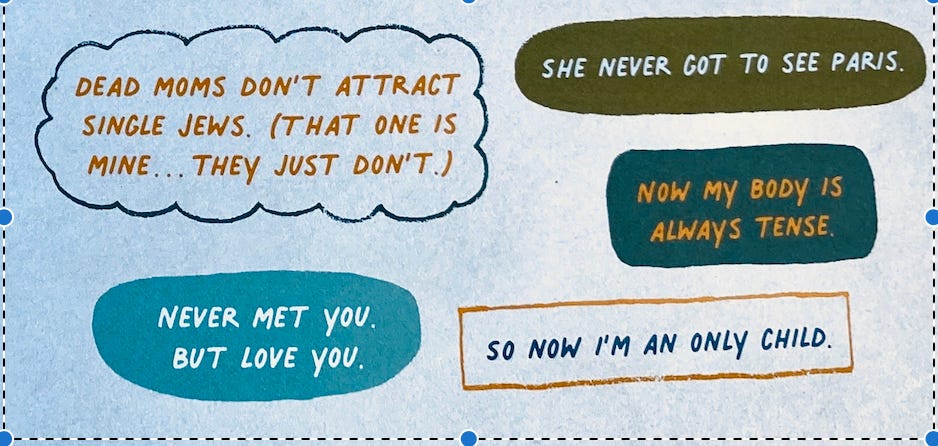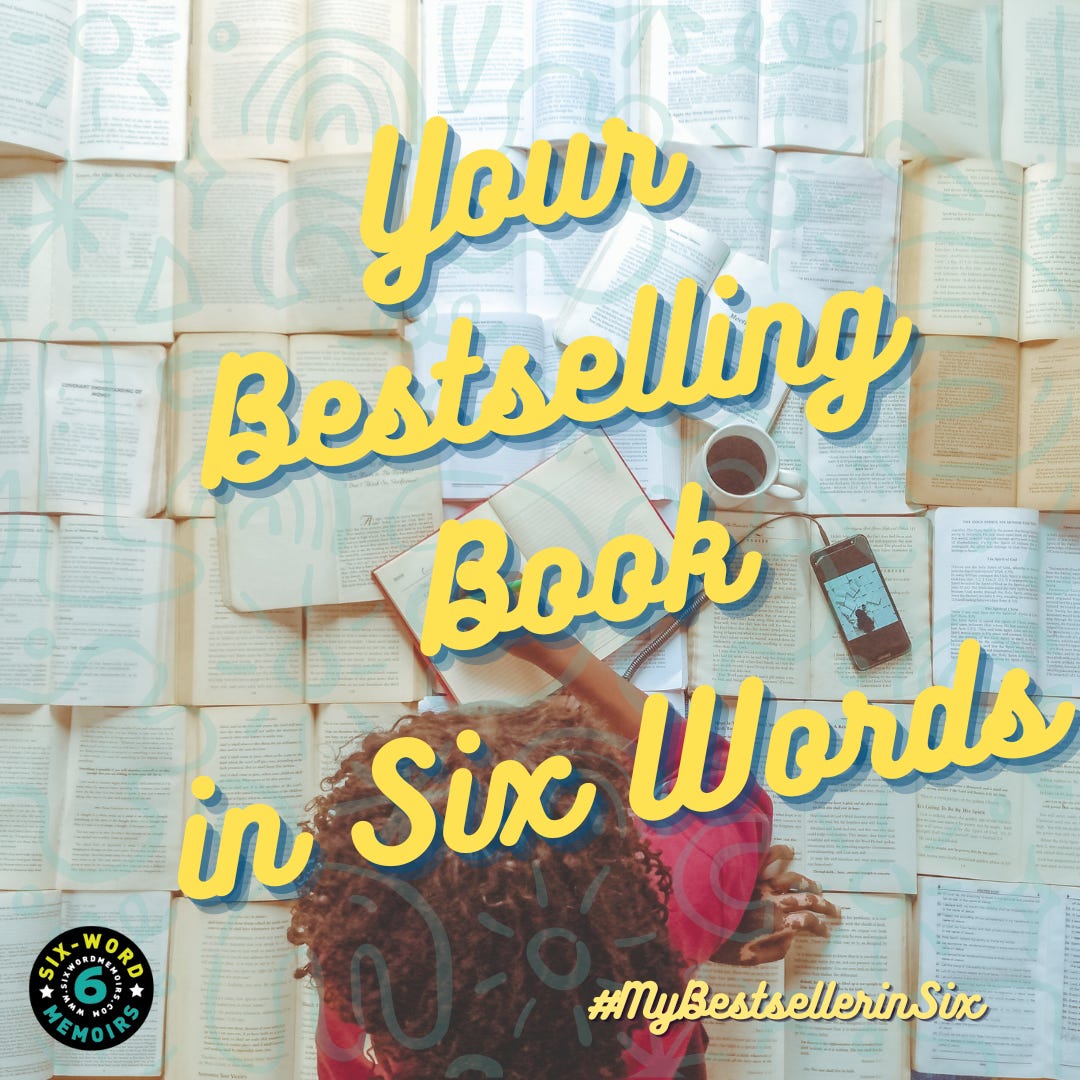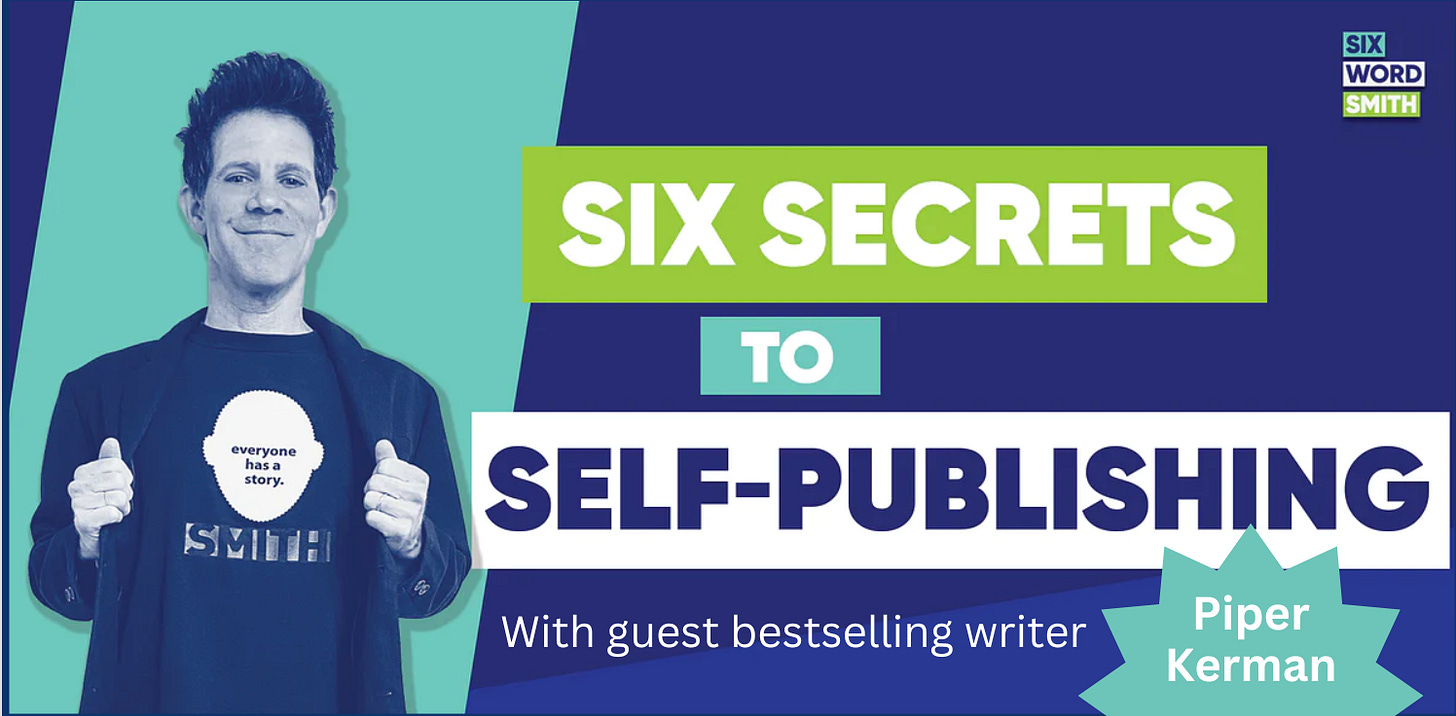Good Grief: The Power of Short Stories To Get to the Heart of Big Feelings
Plus: Our free publishing webinar on July 19 with Piper Kerman; SixContest: "Your Bestselling Book in Six Words"; this month's "Craft of Writing" tip on thawing writer's block
Good Grief (Add Four More Words)
More than a decade of teaching the Six-Word Memoir format has taught me a lot about how and when we humans need to tell, share, and hear stories. And here’s what I learned: our stories are most needed when we are having what a special person in my life calls “big feelings.”
When my son was born, I was so flooded with joy, it was hard to find the words to express it. What did I do? You guessed it. I wrote a Six-Word Memoir: “Hitchhiked to delivery room: blizzard boy!” (Backstory provided upon request.) When my father recently died, I wrote the hardest assignment of my life, one that was considerably more than six words: his eulogy. But in the days, months, and years ahead, I know the six word format will be a meaningful tool to help me preserve the memory of my dad and all the big feelings his life has brought me. And so many beautiful branches in the Six Word tree, the idea of “six words for loss” isn’t mine, but Rebecca Soffer’s, co-founder of the Modern Loss project, a project she describes as “candid conversations about grief — beginners welcome.” I’ve worked with Rebecca to produce powerful loss-themed Six Word Live shows, and I am so honored that she incorporates Six-Word Memoirs into her thoughtful approach to processing grief. Below is the cover of her latest book, The Modern Loss Handbook, along with its Six-Word Memoir section, offering: “Keep coming back to this page and add another six-word story whenever you want to meditate on memories, feelings, wishes, or anything that comes to mind about your loss experience.”
SixContest: Secrets and Bestsellers
ICYMI: In celebration of the bygone Mother and Father’s Day, we asked Sixers to share their unique relationships with their parents in our “Six Word Secrets For Our Parents” contest. You shared stories about cherished memories and life lessons, bittersweet journeys and unanswered questions. Be sure to read our favorites and the winner in our blog post, The Top Six “Six Word Secrets For Our Parents”!
Our newest Six-Word Memoir contest asks a rhetorical question: Who wants to write the next big bestseller? So for SixContest #152, “Your Bestselling Book in Six Words,” we challenge you to describe your novel, life, or any story that needs to be out in the world.
Sixers already rose to the challenge, recounting remarkable experiences (“Surviving six days on a ledge.” — David Cicotello) and heartfelt tales (“Motherhood: How to Dodge Flying Dolphins” — Neesha101). Others leave us eager for more with their captivating titles (“Third Time's a Charm: My Families” — KyleSmithLaird") and humorous anecdotes (“Tail of my emotional support barometer.” — CanadaGoose).
Share your “bestseller in six words” on the Six-Word Memoir contest page or on social media with the hashtag #MyBestsellerinSix. We’ll send our Top Six winners a copy The Best Advice in Six Words, a book with advice on love, life, family, and — you guessed it — writing.
Who Wants to Write and Publish a Book?
I’m holding my next free “Six Secrets to Self-Publishing” workshop on July 19 with a special guest, Piper Kerman, bestselling author of Orange Is the New Back. These workshops have been as invigorating for me as for those who've joined the Zoom room. Why? Because I love when a stuck, frustrated, or confused writer begins to feel unstuck, inspired, and motivated to take the next step to get their book done. After fielding questions about the writing and publishing process from friends, parents of friends, and the occasional stranger on a train, I decided to offer free workshops to answer these questions in an organized way. We’ll spend a little over an hour going through some tricks to get “unstuck” and then I’ll detail the four paths to publishing. At the end of our time, you’ll get a discount to publish your book with my publishing partner, AuthorHouse, which includes book coaching by me. The next webinar is July 19, 12pm PT/3pm EST. RSVP here.
Short Cuts: Six-Word Reviews
From the World: After my dad died, when I finally felt human enough to get lost in a couple of TV shows, I saw grief everywhere, even in my favorite TV shows. From a distance, Somebody Somewhere and The Bear couldn’t be more different. Somebody Somewhere, loosely based on the life of the show’s star, Bridget Everett, tells the story of Sam, a talented singer who leaves NYC and returns to her small hometown in Kansas to help with the family farm after her sister dies. It’s a beautifully melancholic show about doing the hard things with heart and humor. The recently Emmy-nominated The Bear needs no introduction. It’s not billed as a show about grief, but after just a few episodes the subtext of loss — and the demons loss brings — becomes another character in the show. Somebody Somewhere takes the viewer on a slow and humble tractor ride through the rolling fields of Kansas while The Bear puts us inside a rocket ship headed either to the moon or inflight implosion.
Larry’s Six-Word Review: “Grief TV: streaming fast and slow.”

From Substack: If you have a favorite coffee mug, it might one day become a “keepthing” which, according to editor Deborah Way, is “a love story in disguise.” Way heads The Keepthings memoir project which curates stories about everyday objects or unique trinkets that once belonged to loved ones who have passed on. Each week, the newsletter features a curated collection of objects, often from acclaimed authors. From monogrammed shirts to a pair of barber shears, readers are offered a glimpse into how even the most mundane items can become treasured mementos. The Keepthings honors the consequences of being loved and the collective experience of holding on to objects with rich stories.
Danielle Shum’s Six-Word Review: “Oh, beloved history: ebbs, flows, aches.”
Craft of Writing: Let Go of the Fear
Have you ever accidentally stumbled across a clip of some frivolous reality dating show and found yourself unable to look away? Or maybe you catch a glimpse of a trashy gossip article and can’t help but skim the details? Perhaps you can’t stop yourself from perusing the infamous AITA subreddit?
As much as we may label these media sources as “guilty pleasures,” there’s a specific reason why we can’t help but indulge — and that reason boils down to conflict. As human beings, we are fascinated with conflict, and all the above — reality shows, gossip magazines, and AITA stories — revolve around conflict in its purest and simplest form.
Sometimes, as writers, we forget that conflict is the crux of storytelling. For some, it’s a matter of simply getting caught up in the nitty gritty details of a story rather than the big picture. But for many, it’s a fear that adding or heightening conflict in a story will make the narrative too “obvious” or “derivative.”
My advice? Let go of that fear. Traditional conflict structure — a character overcoming obstacles to achieve an objective — has existed for thousands of years not because writers are lazy or repetitive, but because readers have remained consistently interested in stories of conflict. Live in the conflict of your story, and your readers will too. As reality television and ridiculous subreddits have taught us — it’s far better to have a story that is obvious’ or derivative than no story at all. —Dale Tanner
To prove our point, take a look at these intriguing Six-Word Memoirs about conflict:
“Fingers bleed while playing every note.” — vanegonza
“I love you both, don’t fight.” — negativekass
“Sometimes, my restless dreams awaken me.” — canadafreeze
“When she couldn’t, she still did.” — Kate29
“Moment that matters most? This one.” — Mindful
“I am at war with apathy.” — Springlawrence








